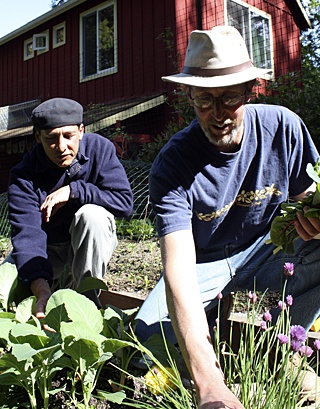Didier and Kathryn Gincig are one of many families in the islands participating in a growing trend: maintaining their own vegetable gardens.
“I want to reduce my impact on the world,” Didier said. “I like the thought of having it right outside my door.”
The Gincigs, who live in Bonnie Brae, took out a portion of their front lawn to make room for a garden. They also planted along the side of their house and in the backyard. They placed their seed order in January, and the kale, spinach, lettuce, carrots, and herbs are now beginning to flourish.
Didier says he was inspired to install a garden because of Patrick Bennett, who owns Good Earth Works on Orcas. Bennett has been focusing on getting islanders to grow their own food with his guidance.
“To me, you either spend money or you invest it. If you invest in a garden, you start getting paid back as you harvest your food,” Bennett said. He also advocates a “less lawn, more garden” approach to landscaping.
Didier, who loves to be outside, plans to grow his own food for the rest of his life.
“It keeps me healthy to be outside and getting exercise,” he said.
Orcas resident Eric Morris is also embarking on a new gardening experience. After clearing a few trees in December, Morris brought in 12 dump truck loads of dirt to his home on Buck Mountain. Just last week he and Bennett finished planting the beds, which are home to potatoes, peas, kale, chard, lettuce, zucchini, tomatoes, peppers, and carrots.
“The fundamental reason for doing this is to eat better,” Morris said. “I want to eat fresh, healthy food. I’ve participated in some vegetable gardens in the past, but I’ve never done it seriously. I wanted to know what it takes to grow a significant portion of my food. And I also like being a little more independent of the agricultural industry.”
Morris says he loves being outside every day, getting his hands dirty, and seeing plants come out of the ground from just seeds.
“I’m not very knowledgeable about gardening, but there’s tons of information available and lots of experienced people around who like to help,” he said. “I wouldn’t let lack of knowledge or experience stop anyone from trying this. Whatever space you have available, put some seeds or starts in the ground and start growing food.”
Didier and Bennett say they are seeing more and more local families becoming vegetable gardeners.
For a book to get started, Bennett recommends “Edible Forest Gardens,” a two-volume set available at the Orcas Library. The books explain how to create a garden that produces a yield as diverse as the multi-layered architecture of forests.
“If you have a little fenced in area with sun, soil, and water, the magic can happen,” Bennett said.




